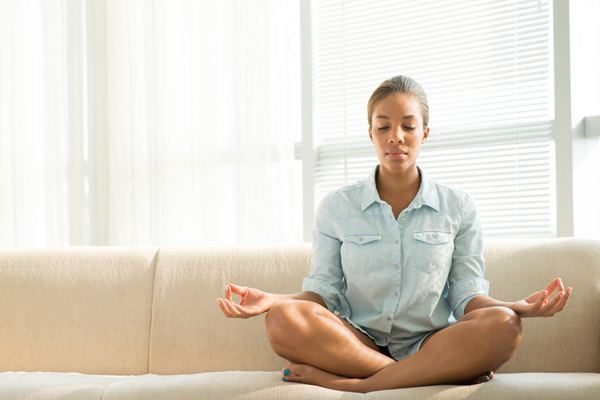Yoga and meditation are often recommended for managing stress, as seen in “Coping with Coronavirus Anxiety,” an article published by Harvard Medical School.
Yoga teaches us how to be mindful, aware of our thoughts. Our meditation practice boosts the mental strength we need. We can change our thought patterns when appropriate.
Still, even the most dedicated yogis are beginning to feel the stress of the coronavirus pandemic. We might imagine that, as yogis, we’re immune to the effects of stress. That’s a good theory, but it doesn’t always play out in real life. After all, yogis are human too.
The Importance of Recognizing Signs of Stress
Change causes stress. And we’re all experiencing change right now. We can benefit from noticing how stress is affecting us. Then, as we work to reduce our stress response, we’re more inclined to see improvements.
Some symptoms of stress are easy to recognize. Others are less obvious. WebMD and Healthline are good resources for in-depth explanations of stress response. Several of the effects of stress listed on these websites are listed below.
You might recognize some of them. If your symptoms are a recent issue, you could be having a pandemic stress response. Make note of your symptoms and then read below to learn how yoga can help you feel better.
Common Symptoms of Stress Response
- Low energy
- Digestive upset: diarrhea, constipation, appetite changes
- Nausea, dizziness, headaches
- Aches, pains
- Chest pain, rapid heartbeat, increased blood pressure
- Insomnia or sleeping too much
- Decreased immunity, frequent colds
- Teeth grinding, aching jaw
- Increased/decreased weight
- Muscle tension in neck, face, shoulders
- Skin conditions: eczema, acne
- Sweating
Mental Symptoms:
- Depression, anxiety, general unhappiness
- Anger, irritability, restlessness
- Feeling overwhelmed, unmotivated, unfocused
- Constant worry, anxious or racing thoughts
- Moodiness, irritability, anger
- Loneliness, isolation, withdrawing from others
- Difficulty remembering or concentrating
- Making bad decisions, poor judgment
- Seeing only the negative
- Procrastinating or neglecting responsibilities
- Using alcohol or drugs to relax
- Nervous habits, like nail biting and pacing
Helpful Advice to Reduce Stress Response
Yogis tend to take life’s challenges in stride. Our practices give us the skills to manage mental negativity. Yet as I mentioned above, we’re living in unusual times. We might need to work a little harder to retain our sense of calm. Read through the following recommendations. If you find something that appeals to you, add it to your daily routine.
Connect with People
People like to get together and share experiences. Social distancing is not in our nature. It’s important to know this and take some action to connect with your friends and family. Make phone calls. Send texts. Video conferencing has become more popular than ever during this pandemic. There are many free apps and platforms that connect us through our computers or mobile devices.
Connect with Nature
Walk and play with your dog more frequently. Spend more quality time with your cat. Cat’s purrs are known to be effective stress relief for humans. (I confess to searching YouTube for some purr time.) Lately, I’ve been spending more time in the garden. I talk to the birds, bugs, and plants. It might not change their lives much, but it enhances mine.
Get Moving
One of the best stress-busters is physical movement. Of course, we can’t visit our favorite gym just yet. But we can spend some time outdoors. Take a brisk walk through the neighborhood, waving to neighbors who you might otherwise have never met. I understand from family and friends that their homes haven’t been so clean in years—housekeeping is great exercise!
Online exercise classes and apps have been available for years. Maybe now is a good time to explore those offerings. Many doctors and clinics now conduct phone and video consultations. If you have doubts about starting a new exercise regime, it’s easier than ever to ask your doctor. At any rate, there’s no need to overdo. The idea is simply to get moving.
An online yoga class might be a good fit for you. There, you can learn more about how to relax and breathe through anxiety. The studio I attend now offers hatha yoga classes online.
Engage Your Senses in Something Pleasant
Normally, yogis don’t deliberately pursue sense pleasures. There’s a danger in overindulgence. However, by making wise choices, we can use the senses to direct our minds to healthy activities. Here are a few suggestions:
- Watch a favorite movie—one with a happy ending. Even better, watch an old musical that you can sing along with.
- Revisit your music collection. Whether you find it on your phone, iPod, or even on vinyl—revive your tunes for a cheerful stroll down memory lane. Chosen wisely, music is a proven mood therapy that instantly lifts your spirits.
- If you enjoy cooking, prepare some favorite comfort food. But imbibe carefully; remember, one of the signs of stress is weight gain.
- Take a bath or foot soak with Epsom salts. An inexpensive therapy, salt soaks are soothing and relaxing. You might also enjoy including some of your favorite essential oil for aromatherapy. Relax in your bath and add a few drops of gratitude.
Help from Quiet Karma
As noted earlier, medical professionals recommend yoga because it helps decrease stress. Many of Quiet Karma’s articles published before the pandemic are especially useful now. Here are a few suggestions:
- Read an interesting yoga book
- Difficulty sleeping or meditating
- Journaling
- Yoga chanting for peace
- Avoiding bad company
The last link in this list is especially important. Although we’re tempted to remain current on the constantly changing situation, too much news has a negative effect. Try to limit this input and add some of the nurturing activities listed above. Your health, happiness, and peace of mind depend on it.
What are your favorite stress busters? Please share them with others in the comments section below. If you’ve found this article helpful, send it to a friend—use it as a reason to reconnect with someone you love.
Chityānanda has been a disciple of Svāmī Gurupremānanda Sarasvatī since 1975. She teaches meditation and yoga as a spiritual path in Santa Cruz, California.



This is another excellent article, and the recommendations on how to combat this feeling of isolation and stress is definitely needed. During this time I have tried not to let being in quarantine effect me personally. However, their are other events that have taken place that have touched me — the killings of black men and women. These events are not new they have been occurring since post slavery. As a woman of color striving to be yogic in my thinking and consciousness. Lately, I have grown disenchanted with the world. Which has brought about a strong sense of detachment, sadness and anger. The good thing about this is that I have find solace and determination in doing my spiritually practices. I think this is the only way to surpass any feeling of stress and despair that I may be experiencing. As for the Covid-19, I don’t fear death, nor do I want to die gasping for breath, but if it’s my time so be it. Also the list you provided is helpful, because I noticed few afflictions I may be experiencing. I am enjoying sleep a bit too much. I feel a bit of depression and my motivation goes up and down. But, I am strong, I will persevere to become a true yogi.
Thank you for your thoughts, Nakisa. Personally, I don’t know how anyone can move through the the challenges we’ve had this year without the help of yoga. One thing that helps me deal with many situations is the remember the wisdom of the stoics–that we should not worry about things of which we have no control. We can control our thoughts and actions, so we can focus there. I hope you will keep meditating, studying Sanskrit, and using Sanskrit for the chants that you know. I’m confident that you will find peace there. Namaste.
Thank you for the article. This has been a good time to do things that I’ve put off for years. So, I’m doing some of it. Maintaining daily structure helps me the most. I do the same thing the same time everyday. Days go by fast and everything is cool.
That’s an excellent point, Modesto! We all need structure during this time of great stress and uncertainty. It’s helps us to build the strength to deal with events that challenge that structure. Another word for structure is discipline. (But most people don’t like that term.) But all the yoga masters teach that discipline gives us peace and joy. It sounds like you’re experiencing this. Namaste.
In the mornings I walk to a big beautiful church. Along the way, right off the sidewalk there’s a big popular donut shop. Such is my stress. Or rather, I share lots of stress with a donut. The donut, lovely atmosphere, birds solve stress. Not problems.
It’s good to hear from you, Tony, and to see how you’re dealing with stress. I’m sure our readers are humored by your choice: donuts–to be or not to be. Nothing wrong with an occasional good treat. Enjoy!
As I read the list of common symptoms, I was shocked to see many that I recognize – either in myself or my wife. Thanks for bringing this to the top of my awareness pile!
“Awareness pile”–that’s one way of looking at it! There’s so much competing for our attention, even before this pandemic! But taking care of yourself and your loved ones should always be on top. I’m glad to hear that you found something useful in the post, James. Namaste.
I use exercise bands now. I keep them near my meditation chair so I remember to to some strength and toning exercises periodically.
It’s nice to hear from you again, Richard, and thank you for sharing how you manage to remember to exercise. Exercise, movement, is just about the best stress-buster we have! Namaste.
I like the positive actions under get moving.
Thank you, Richard. Your comment reminds me that I should have added something about the benefits of repetitive movement, like dancing, swimming, or rowing! Namaste.